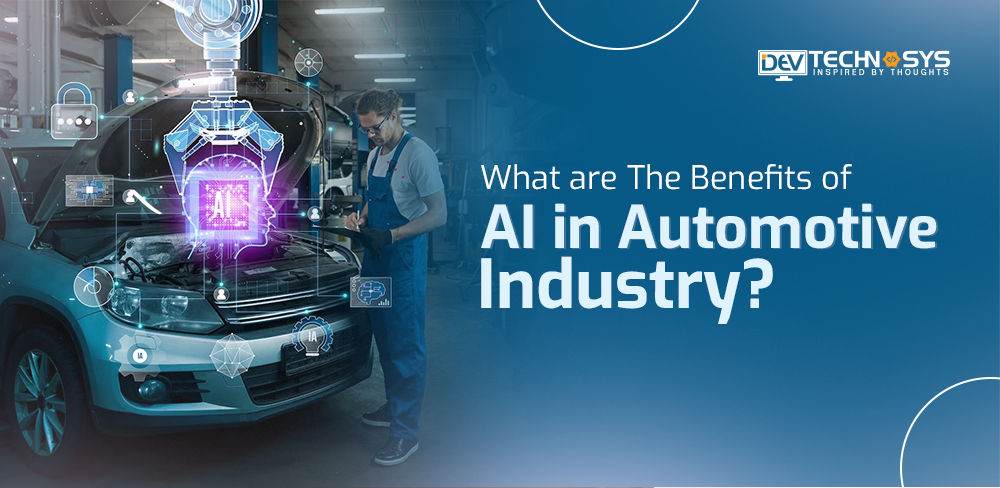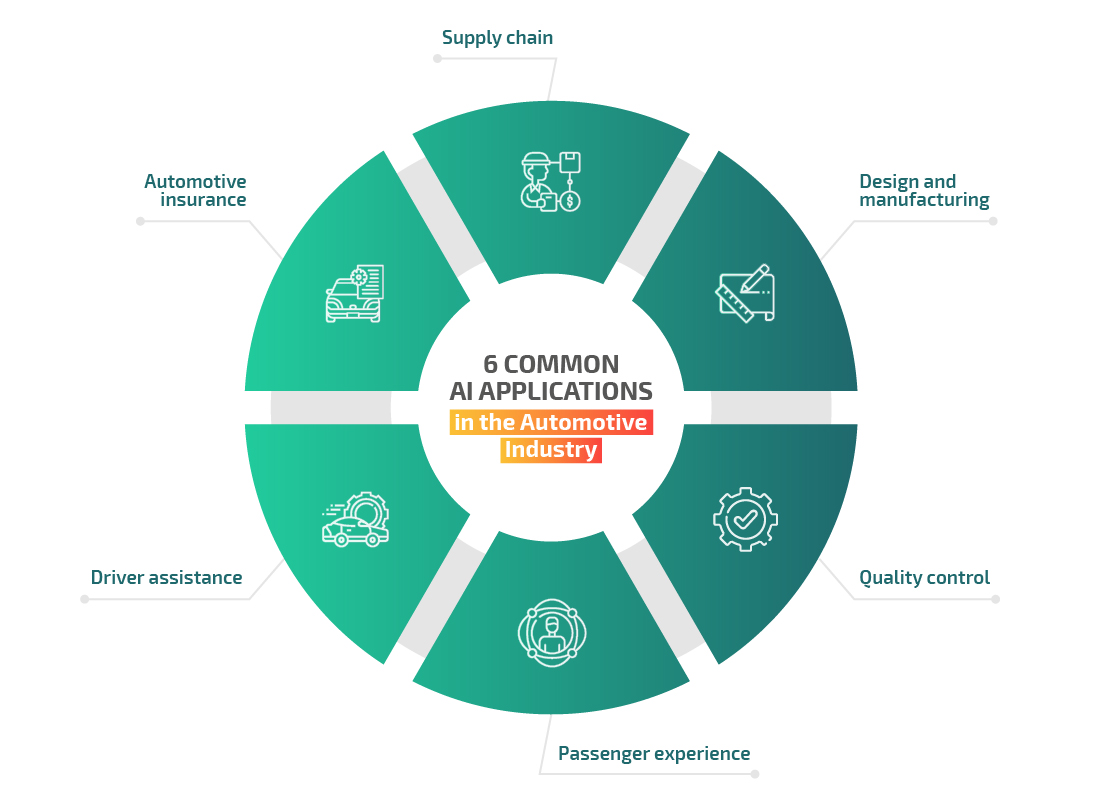In the tech-savvy age, people expect their cars to be just as intelligent as their smartphones or computers. Artificial intelligence has made our vision of smart cars a reality. AI has a significant impact in nearly every industry, but the automotive sector is particularly powerful.
AI in automotive industry has changed many levels, from self-driving cars to industrial robots in production factories. Mercedes-Benz is one of many large automotive companies that are actively adopting AI to improve customer experience.
In order to achieve the vision of autonomous vehicles, automotive manufacturers are adopting advanced AI-based solutions for software development. In the end, the industry relies on AI for the design and manufacture of vehicles. It is clear that autonomous cars, hybrid cars and electric cars are the future.
So, in this blog, we will discuss the benefits of AI in automotive industry along with challenges and how AI has impacted the automotive industry.
What is AI in Automotive Industry?
AI is the ability of machines to perform various tasks that require human interaction, including learning, reasoning and designing. AI is used in the automotive sector to improve vehicle performance and driver safety. It also helps passengers enjoy a better experience.
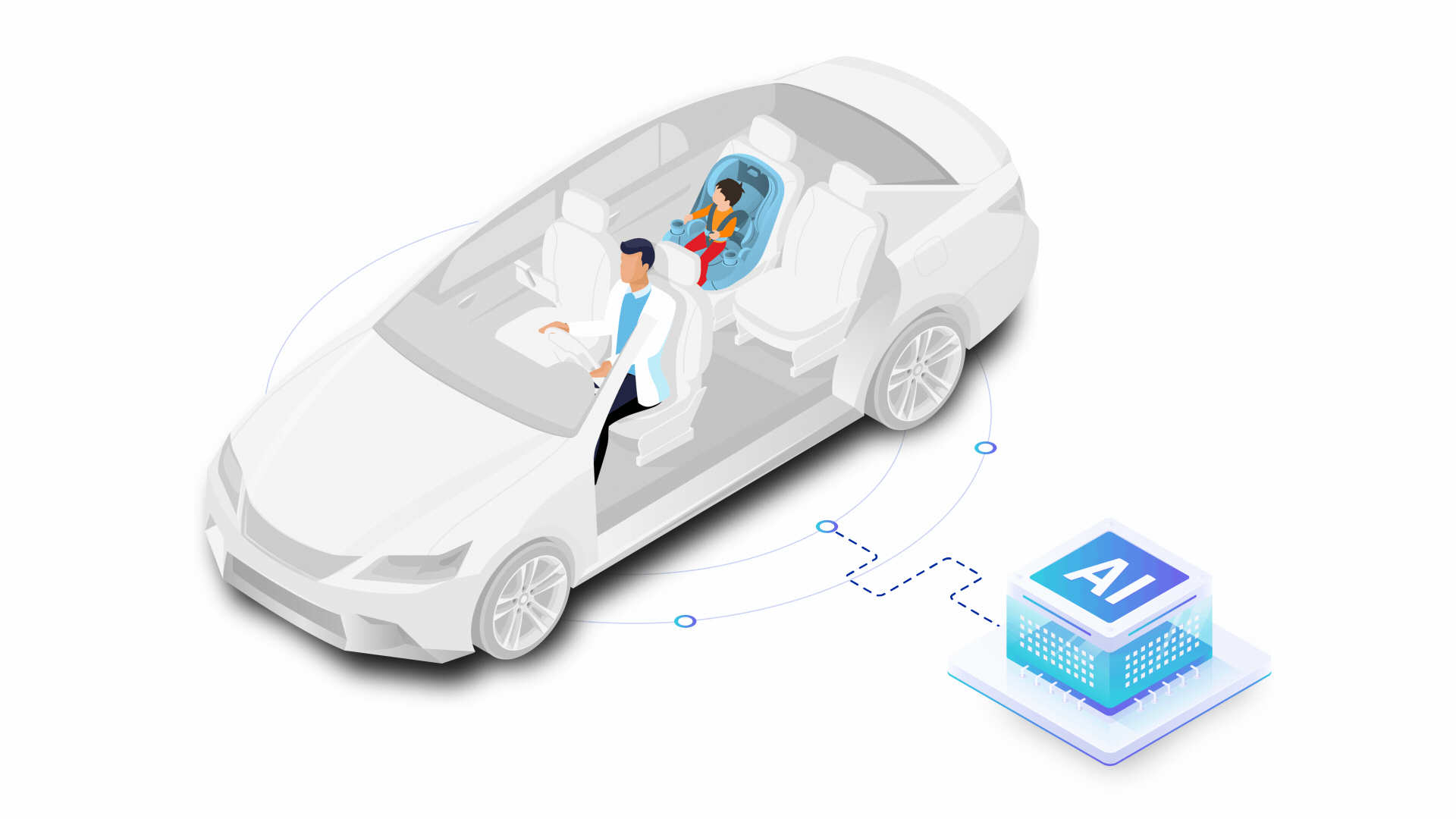
AI in automotive industry encompasses a broad spectrum of technologies such as computer vision, NPL (near-field communication), speech analytics, and robotics. However, if you are looking to leverage these advancements, you should partner with an AI development company for expertise and solutions.
Automotive Industry Market Statistics
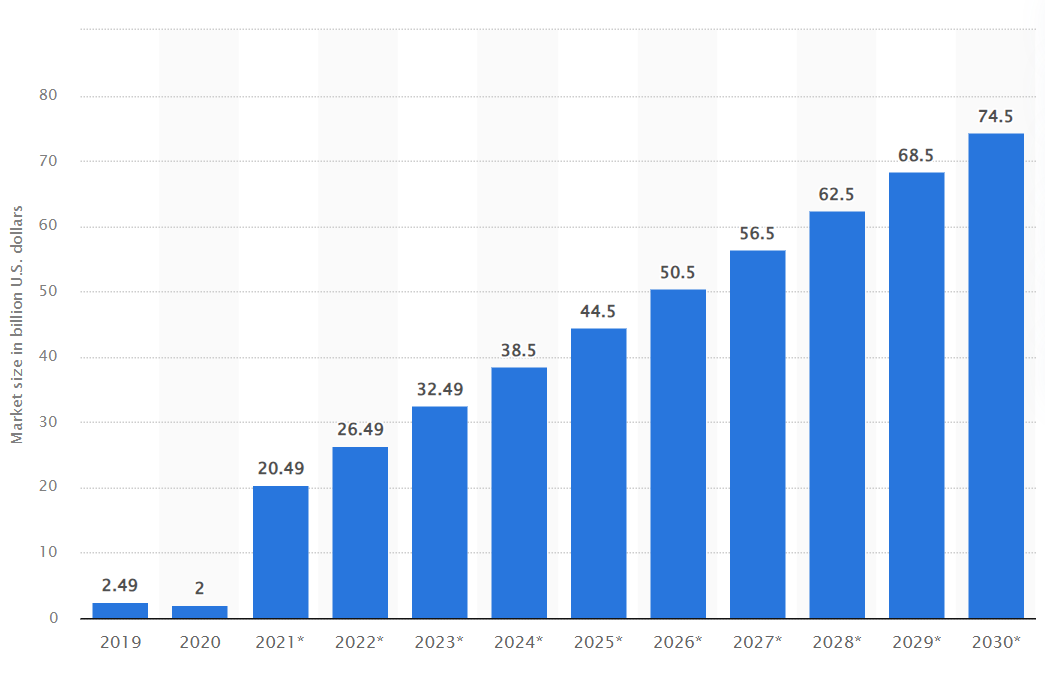
- Next Move Strategy Consulting projects that the global automotive intelligence industry will grow between 2019 to 2030. The market size was estimated at around 2.5 billion U.S. Dollars in 2019. It is projected to grow to 74.5 billion U.S. Dollars in 2030.
- In 2022, the global automotive manufacturing market was valued at $2.9 billion. It is growing at a 3.1% CAGR after several years of decline. The market declined by 0.6% from 2017 to 2022.
- In March 2023, 75% of Americans reported owning a car. An additional 20% had access to a family or company car.
- The road vehicle and part retail sector has recovered quickly from the COVID-19 epidemic. Revenues from this sector have risen to over 1,53 trillion U.S. Dollars.
- In 2015, the AI in industrial automation shipped 7.5 millions AI-based systems.
- By 2025, nearly 60 percent of new cars sold worldwide will be Level 2 autonomous.
Benefits of AI in Automotive Industry
It offers numerous benefits to the automotive industry, especially when harnessed by an automotive software development company. Here are some of the benefits that must check out:
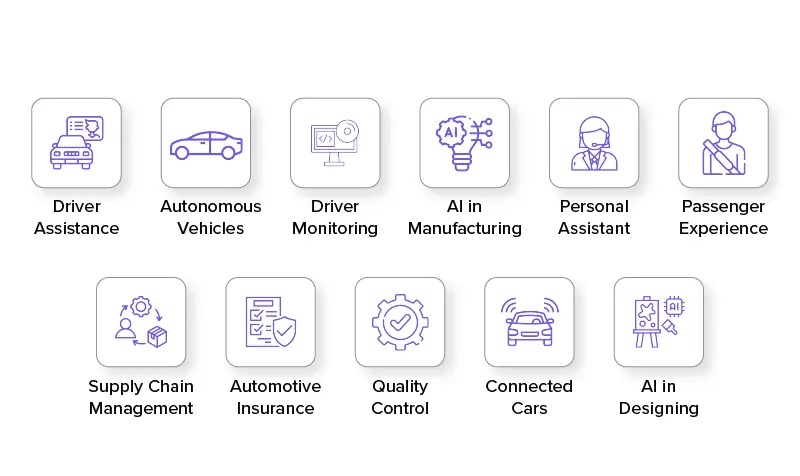
1. Driver Monitoring
An AI app for automobiles can automatically detect if a frequent user is driving and change the temperature, mirrors and heart rate when they are in the vehicle. Even during an accident, AI in automotive industry can assess the position of the upper body and deploy airbags according to that.
2. Assistance For Drivers
There are only a few small steps between driver-assist AI and fully automated cars. Artificial intelligence systems use sensors, for example, to monitor blind spots, assist with steering and pedestrian detection, alert the drivers as needed, and respond automatically in cases of danger.
3. Combating Insurance Fraud
Fraud is an important issue in the auto insurance industry. Insurance companies pay billions in fake claims each year. This will result in higher premiums for policyholders. When combined with natural-language processing, it can identify AI trends that are questionable in claims and flag them for human evaluation.
The AI in automation industry can predict fraud risk based on customer profiles and behavior patterns. This is one of AI’s key benefits of autonomous vehicles.
4. Navigation
AI enhances driver decision-making through advanced navigation systems. Modern AI-powered navigation, leveraging real-time data on road closures, accidents, traffic, and construction, recommends optimal routes. For businesses seeking such innovations, it would be helpful to hire mobile app developers for developing cutting-edge navigation applications.
5. Designing vehicles with Digital Twins and AI
Digital twins have become a standard tool for AI automakers to use in their production facilities. They simulate the impact of AI of different design choices on a vehicle’s performance, which helps them speed up the design process.
Engineering and design professionals are able to gain insight by feeding machine-learning algorithms with sensor and historical data. This technology also helps to reduce the cost of testing prototypes.
6. Vehicle Diagnostics Remotely
Auto manufacturers and car owners both benefit from predictive analytics-driven maintenance. Customers who are notified of possible technical issues in a timely manner choose auto manufacturers to supervise their vehicles over independent auto repair shops.
7. Simplified Auto Insurance
After a collision, drivers can take pictures of their cars using the camera on their phones. AI and computer-vision systems can then analyze the damage. This allows for a faster and more AI in cars evaluation.
8. Marketing Automation
Auto marketers must use AI today. Marketing experts can find new opportunities for upselling and cross-selling, automate the lead management process, customize advertisements, estimate demand, and improve marketing tactics.
9. Personalized Voice Assistants
Some car companies have developed their own voice recognition software. While others use third-party personal assistants, like Alexa or Siri, other automakers are developing their own. These assistants can make calls, change radio stations, inform the driver of the remaining gas in the tank and adjust the temperature. These tools can also be very personalized.
They may remember the driver’s preferences and make suggestions for changes depending on the situation or previous user behavior. So, if you are also looking to build software for Automotive business and want to integrate voice assistants in it, then you should hire AI developers.
10. Predicting Demand
AI-based demand forecasting has proven successful in the automotive industry. Intelligent solutions are able to forecast demand by analyzing economic conditions and changing business environments. It also allows producers to reduce costs associated with excess inventory by adjusting production in accordance with orders.
AI systems, in collaboration with Industry 4.0 technologies like blockchain and IoT, consider data on shipments and equipment conditions. Partnering with an experienced IoT development company can further enhance the seamless integration and utilization of these interconnected technologies for optimized operations.
It can improve supply chain transparency and traceability, ensure visibility throughout the chain and, at the end, transform the supply chain to a smart supply chain.
Challenges of Implementing Artificial Intelligence in the Automotive Industry
Artificial intelligence has many advantages in the automotive industry, but its implementation is limited. Let’s discuss the main challenges of using AI in Automotive Industry.
1. Bias Artificial Intelligence
AI systems can be biased, so it is better to use efficient algorithms than AI. All algorithms that are responsible for safety-critical features should be thoroughly tested and examined. The correctness of algorithms can be assessed manually or by using sophisticated mathematical assertions.
2. Low-Quality Data
The challenge of collecting a large dataset with high-quality data that is well-labeled and recorded is significant. AI-powered solutions must be accurate, fast, and predictable to gather accurate real-time reactions to different on-road scenarios. To ensure accuracy and quality, all data, regardless of its source, must be thoroughly reviewed and tested in artificial intelligence in cars.
3. Sensors and Equipment Limitations
Data quality is influenced by the technological capabilities of sensors and data collection equipment. The wrong equipment or sensor can produce a lot of irrelevant data.
4. Explainable AI (XAI)
The automotive industry would benefit from XAI solutions (explainable AI) rather than black box models. Unlike AI-powered models that use black boxes, XAI provides people with easy-to-understand and transparent decisions. AI automotive app development services providers can then quickly identify any faults in the system and make changes.
5. Non-Adherence to Laws and Regulations
The adoption of relevant rules and regulations in the automotive industry is slower than deep learning and AI applications. This leaves legal loopholes for the development of AI solutions in the automotive manufacturing sector. It would be helpful to take into account some factors when developing software.
How is AI Used in Automotive Industry?
With the introduction of Artificial Intelligence technologies, the automotive industry has experienced a major transformation. These advances have improved vehicle performance, but also revolutionized driving standards and the experience of driving. So, before you create a mobile app with AI generated technology, you should look at these points that highlight the use of AI in Automotive Industry.
1. Autonomous Vehicles:
AI is a pivotal component in the development and design of self-driving or autonomous vehicles. These advanced vehicles, while promising enhanced safety and convenience, often involve substantial costs to build an artificial intelligence project. AI-driven development requires significant investments in research, data collection, algorithm refinement, and infrastructure.
2. Advanced Driver Assistance Systems:
AI is essential to ADAS implementation, including features like adaptive cruise control and lane departure warning. These systems use AI in Automotive Industry algorithms to analyze sensor and camera data, which allows the vehicle to assist in different tasks and improve overall safety. ADAS improves comfort while driving and reduces accident risk.
3. Predictive Maintenance:
In the automotive industry, AI is used to predict maintenance. AI algorithms are able to predict component failures by analyzing data collected from sensors and other connected devices in the vehicle.
This allows proactive maintenance to be performed, which reduces downtime and prevents unexpected breakdowns. Predictive maintenance extends the life of vehicles and improves their overall reliability.
4. Customized User Experience:
AI in Automotive Industry allows for the creation of intuitive and personalized user interfaces in vehicles. Natural Language Processing (NLP), voice recognition and other technologies improve communication between vehicles and drivers, allowing them to control various functions without having to use their hands. AI can adapt settings like climate control, navigation, and music to the user’s preferences over time.
5. Supply Chain Optimization (SCM):
AI is used to optimize supply chain operations in the automotive industry. Machine learning algorithms, often implemented by specialized machine learning development services providers, use historical data, market trends, and external factors to forecast demand, enabling manufacturers to enhance efficiency and reduce costs.
6. Tests and Design For Enhanced Vehicles:
AI in test automation is used in the vehicle design and testing phases. AI in automotive industry is used to create generative design algorithms that explore multiple design options, taking into account factors like aerodynamics and weight distribution.
AI simulations allow manufacturers to test the safety and performance of vehicles under different conditions, before building physical prototypes. This saves time and money.
Future of AI in Automotive Industry
AI-enabled cars are changing the way the auto industry is viewed. Autopilot actively works with smart parking and steering, acceleration, breaking, and braking in Tesla vehicles. Statista estimates that the global automotive digital transformation was valued at $26.49 Billion in 2022, and is expected to grow to $74.5 Billion by 2030.
BMW’s latest models are equipped with AI voice assistants that enhance driver comfort and safety. Audi uses computer vision to inspect the sheet metal of vehicles. This can detect even the slightest cracks during production.
Mercedes-Benz also manufactures level 4/5 self-driving vehicles with Bosch’s help. Other companies are actively adopting AI in the automotive industry technologies in order to support their future-oriented action plan and stay on top of the AI trends within the automotive industry.
We can predict, based on the increasing number of automakers adopting self-driving technology, that autonomous vehicles will eventually be preferred to manual driving. By the end of the decade, 90% of cars will have AI in Automotive Industry systems installed.
AI will have a major impact on artificial intelligence in the transportation industry in the future. From manufacturing, designing and servicing to sales and marketing. It will be a key factor in making cars smarter, safer and more efficient.
Conclusion
AI has many advantages in the automotive industry. AI can improve customer satisfaction, safety, performance and efficiency. AI in Automotive Industry is also used in autonomous driving, maintenance prediction, and personalization. AI has so many applications that it’s no surprise the industry is embracing AI.
As artificial intelligence continues to evolve, its pivotal role in the automotive industry expands. The impact is poised to grow, especially with advancements, influencing innovation and creating opportunities for mobile app development services providers.
Frequently Asked Questions
1. What is the Cost of Automotive Mobile App Development?
The cost of automotive mobile app development depends on multiple factors. For example, app complexity, features and functionalities, app design, testing etc. However, to give you a rough estimate, the cost to develop a mobile app will be around $10000-$30000 or more depending on the app complexity.
2. What are the Top 5 AI Automotive Apps?
Below are the Best Automotive Apps that are doing great in the market. Let’s have a look at them:
- Tesla Autopilot
- Waymo
- Waze
- Nauto
- Dashbot
3. What is the Cost Associated with Automotive App Maintenance Services?
The cost varies depending on factors like the complexity of the app, the frequency of updates, and the service provider’s rates. However, the cost of app maintenance will be around $3000-$5000 or more. It would be great to consult with an automotive app maintenance services provider.
